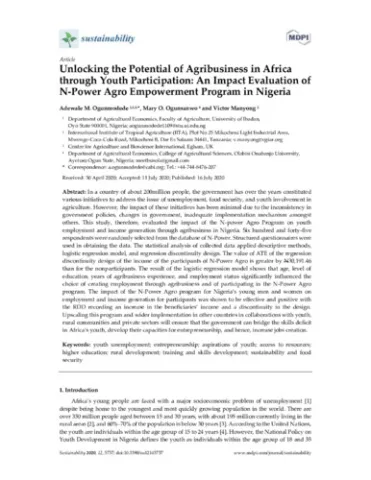Unlocking the potential of agribusiness in Africa through youth participation: an impact evaluation of N-Power Agro Empowerment Program in Nigeria

Abstract
In a country of about 200 million people, the government has over the years constituted various initiatives to address the issue of unemployment, food security, and youth involvement in agriculture. However, the impact of these initiatives has been minimal due to the inconsistency in government policies, changes in government, inadequate implementation mechanism amongst others. This study, therefore, evaluated the impact of the N-power Agro Program on youth employment and income generation through agribusiness in Nigeria. Six hundred and forty-five respondents were randomly selected from the database of N-Power. Structured questionnaires were used in obtaining the data. The statistical analysis of collected data applied descriptive methods, logistic regression model, and regression discontinuity design. The value of ATE of the regression discontinuity design of the income of the participants of N-Power Agro is greater by N30,191.46 than for the nonparticipants. The result of the logistic regression model shows that age, level of education, years of agribusiness experience, and employment status significantly influenced the choice of creating employment through agribusiness and of participating in the N-Power Agro program. The impact of the N-Power Agro program for Nigeria’s young men and women on employment and income generation for participants was shown to be effective and positive with the RDD recording an increase in the beneficiaries’ income and a discontinuity in the design. Upscaling this program and wider implementation in other countries in collaborations with youth, rural communities and private sectors will ensure that the government can bridge the skills deficit in Africa’s youth, develop their capacities for entrepreneurship, and hence, increase jobs creation.
